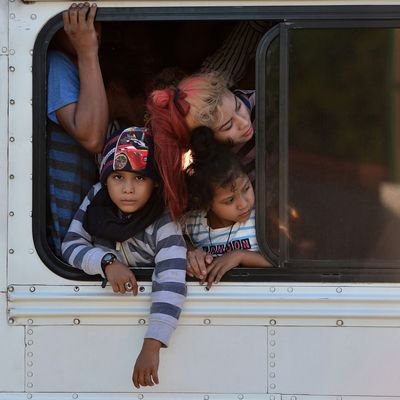
As the 2018 midterms bore down on the American people, many were alarmed to learn of a menacing stowaway: A caravan of migrants heading north from Central America. Roughly 7,000 men, women, and children, had packed whatever belongings were practical to carry on foot and evacuated the Northern Triangle — El Salvador, Guatemala, and Honduras — seeking refuge from gang violence and economic hardship. Several such caravans had made the same journey before, including earlier that same year. What distinguished this one was its unusual size, and more importantly, its proximity to an American election that had been projected to shift the balance of power in Congress, rivening President Trump’s then-united Republican government and installing a Democratic House majority. The conservative political class and its media organs responded accordingly. Trump and his surrogates sought to recast the group of refugees as an invading army, bringing crime, terrorism, and disease to the United States, and bound to overrun the U.S.-Mexico border if Democrats were left in charge (and, by extension, if people didn’t vote Republican that November).
So for a month leading up to the elections, airwaves from Trump’s rally speeches to Fox News’ evening shows to the Twitter accounts of imperiled Republican congressmen were clogged with lies and conspiracy theories about what ills the migrants heralded. Their impending arrival was a national emergency, to hear the president tell it. “Unknown Middle Easterners” peppered their ranks. They were being bankrolled, alternately, by Venezuela, George Soros, and the Democratic Party. “This will be an election of Brett Kavanaugh, the caravan, law and order, and common sense,” Trump bellowed at a rally in Montana that October. For many voters, this scaremongering had its intended effect. “What’s to stop them?,” one Minnesota Republican asked the New York Times. “We have a lot of people who live on lakes in the summer and winter someplace else. When they come back in the spring, their house would be occupied.” That it was all a lie didn’t stop Trump from deploying troops to the border to make a show of manning the barricades, nor did it particularly bother his advisers. “It doesn’t matter if it’s 100 percent accurate,” a senior administration official told the Daily Beast. “This is the play.”
It was telling that both the White House and conservative media fell almost totally silent about the caravan the minute the election was over. A lack of opportunistic utility seems to have provoked a similar silence around the latest development. The New York Times reported on Wednesday that a new migrant caravan had disembarked from Honduras. Currently hundreds strong, it’s taken shape in much the same way as previous iterations — everyday people fleeing terror and poverty, collecting more travelers as it moved. Resistance from host governments stands to be more forceful this time around. Following Trump’s 2018 hysterics, he cut off millions of dollars in aid to the Northern Triangle countries, citing their inability to stop residents from passing through en route to the U.S. and compelling their governments to sign agreements requiring people to seek asylum locally before applying at the U.S.-Mexico border. Earlier this week, Guatemalan authorities tear gassed migrants at the border with Honduras. It’s the only of the three countries where the Trump deal has gone into effect, according to the Times.
Paired with the implementation of the president’s family separation policy earlier in 2018, his pre-election doomsaying around the caravan escalated the naked cruelty toward refugees, asylum seekers, and other Latin American migrants that’s long been a centerpiece of U.S. immigration policy. But it didn’t sway the midterms in the direction he’d hoped. Aside from gaining two U.S. Senate seats, the election was a veritable bloodbath for Republicans, who ceded 40 House seats and the chamber majority, seven governorships, and six state legislative bodies to the Democrats in the highest-turnout race since 1914. If the election was indeed a referendum on the caravan, as Trump claimed in Montana that year, then voters seemed overwhelmingly unconvinced. Caravan fever came and went with minimal fanfare — as many had predicted it would — and no invasion or massive influx of crime, disease, or terrorism accompanying it. Just over a year later, one might reasonably surmise that the advance of a similar caravan would prompt equivalent national security concerns. It has not, and likely will not. The airwaves remain mercifully clear of the type of frantic, around-the-clock coverage warning Americans about the hordes of murderers and habitual defecators soon to be at their doorstep that polluted the autumn of 2018. The difference is not a matter of scale or stronger border enforcement capabilities or a president who’s gathered his senses, none of which have altered that much. For now, the caravan is simply not happening close enough to a U.S. election for Republicans to profitably pretend that it’s an emergency.






























